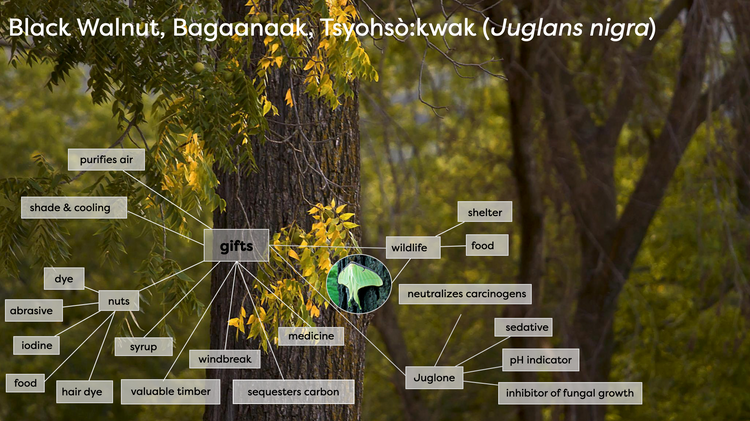"How, in our modern world, can we find our way to understand the earth as a gift again, to make our relations with the world sacred again?... can we behave 'as if' the living world were a gift?... A great longing is upon us, to live again in a world made of gifts."
Robin Wall Kiimmerer
What does Earth ask of us?
"The premise of Earth asking something of me—of me!—makes my heart swell. I celebrate the implicit recognition of the Earth’s animacy, that the living planet has the capacity to ask something of us and that we have the capacity to respond. We are not passive recipients of her gifts, but active participants in her well-being. We are honored by the request. It lets us know that we belong."
Robin Wall Kimmerer
Pocket Forests are songs, poems, love letters to the land. In our gratitude for the gifts of the Earth, we in turn reciprocate by gifting Pocket Forests.
Because we believe generosity is infectious and healing (and because Pocket Forests are living, loving beings), we offer them in the spirit of the gift.
Pocket Forests are gifts. Gifts to the Earth. Gifts to our non-human kin (the Birds, the Insects, the four-legged, and more). Gifts to future generations. And gifts to you.
What can plants teach us about gifting?
"Forests thrive through abundance, not scarcity. All flourishing is mutual. The ongoing reciprocity in gifting stretches... into a whole web of relations that are not transactional."
Robin Wall Kimmerer
ISTEAM shares the teaching that plants — the photosynthesizers — are our first teachers:
"Paying close attention to plant life helps us build stronger relationships with lands and waters, and deepens our place-based knowledge. Plants play important roles within ecosystems so learning from plants teaches us about the many beings that plants are in relation to and about the ecosystems as a whole. Plants can also teach us how to live a good life in harmony with our environment, such as how to care for and respect those around us or how to thrive in difficult conditions."

Think of the gifts of a Seed. A Pecan. An Acorn. A Black Walnut. A Wild Strawberry. In The Serviceberry: An Economy of Abundance, Robin Wall Kimmerer teaches us that :
"In naming the plants who shower us with goodness, we recognize that these are gifts from our plant relatives, manifestations of their generosity, care, and creativity. When we speak of these not as things or products or commodities, but as gifts, the whole relationship changes. I can’t help but gaze at them, cupped like jewels in my hand, and breathe out my gratitude."
What is a gift economy?
"Gifts pass from hand to hand: they endure through such transmission, as every time a gift is given it is enlivened and regenerated through the new spiritual life it engenders both in the giver and in the receiver... gifts transform the soul in ways that simple commodities cannot."
Margaret Atwood
Essentially in a gift economy we receive a gift, and in turn “gift it forward” in a way that is meaningful, appropriate, and within our means. A gift economy is rooted in an ethic of interconnection and reciprocity.
Reciprocating the gift
We are deeply grateful to you for accepting the gift of a Pocket Forest and helping grow a City in a Forest.
Our volunteers, our forest stewards, and our leadership team all gift their labour, their expertise, and most importantly their love. Our ability to offer this gift is reliant on your generosity. Your generosity in welcoming a Pocket Forest to your home. Your generosity to the Earth. And your generosity in supporting our work.
To honour the gift of a Pocket Forest, we invite you to reciprocate with a gift that feels right to you. Ask yourself (after planting, and seasonally):
- How has the Earth been nourished by the Pocket Forest?
- How have I, my family, and my neighbours been nourished by a Pocket Forest?
- What might I freely offer in gratitude now or on a weekly, monthly, seasonal or yearly basis?
Possible non-monetary gifts
There are an infinite number of non-monetary ways to reciprocate the gift of a Pocket Forest. Robin Wall Kimmerer suggests asking:
"What else can you offer the earth, which has everything? What else can you give but something of yourself? A homemade ceremony, a ceremony that makes a home."
Other possibilities include:
- Bring healing medicine to your neighbourhood by sharing the idea and supporting your neighbours in foresting your neighbourhood
- Help prepare, plant, or steward a Little Forest in a location suffering from tree inequity
- Care for your Pocket Forest, protecting them from harm, and watering when there's a drought
- Plant a Soft Landing or Pocket Prairie to further support pollinators, birds, and other creatures with food or shelter
- Share videos or pictures of the beauty and life your Pocket Forest brings to your neighbourhood
- Share fruit, nuts, or seeds with friends, family, neighbours, community, and wildlife
- Help us grow trees and wildflowers by becoming part of a distributed micro-nursery (collecting seeds, propagating seeds, nursing seedlings)
Possible monetary gifts
A monetary gift (a donation) helps offset our costs for purchasing trees, shrubs, and seeds.
We source or start from seed around 70 different species of trees and shrubs. Each costs us between $4 and $20 (or for a food forest, sometimes up to $60). This means a Pocket Forest with nine trees and shrubs might cost us anywhere between $72 to $188 (or $250 for a food forest).
A monetary gift is also a signal of your gratitude for the expertise and labour of the volunteers who help you understand your soil and site, select the tree species based on your goals, and help plant the pocket forests.
All monetary gifts go towards helping us grow a City in a Forest by supporting future plantings of Pocket Forests and Little Forests.
If you'd like to contribute a monetary gift, you can:
- Send an e-transfer to acorn@littleforests.org (no password required)
- Make a contribution when we drop by with the trees or at one of our in-person events
Together, let's weave a web of reciprocity
Together, let's weave the web of reciprocity needed to help Kingston grow into a flourishing, beautiful, equitable, climate resilient City in a Forest.
"Gratitude may seem like weak tea given the desperate challenges that lie before us, but it is powerful medicine, much more than a simple thank you. Giving thanks implies recognition not only of the gift, but of the giver. When I eat an apple, my gratitude is directed to that wide-armed tree whose tart offspring are now in my mouth, whose life has become my own. Gratitude is founded on the deep knowing that our very existence relies on the gifts of beings who can in fact photosynthesize. Gratitude propels the recognition of the personhood of all beings and challenges the fallacy of human exceptionalism—the idea that we are somehow better, more deserving of the wealth and services of the Earth than other species... Reciprocity among parts of the living Earth produces equilibrium, in which life as we know it can flourish. When the gift is in motion, it can last forever. Positive feedback loops, in which interactions spur one another away from balance, produce radical change, often to a point of no return."
Robin Wall Kimmerer, Returning the Gift
References
- Indigenous knowledge and gift giving, Jeanette Armstrong
- The gift of Strawberries, Robin Wall Kimmerer
- Indigenous STEAM: plants, ISTEAM Collaborative
- The gift of Lewis Hyde’s ‘The gift’, Margaret Atwood
- Currency of connection, Rowen White
- Returning the Gift, Robin Wall Kimmerer,
- The Serviceberry: an economy of abundance, Robin Wall Kimmerer
- Giftivism: Reclaiming the Priceless, Pavithra Mehta
Are you interested in a Pocket Forest?
Use this order button to book a consultation or send us an email.

